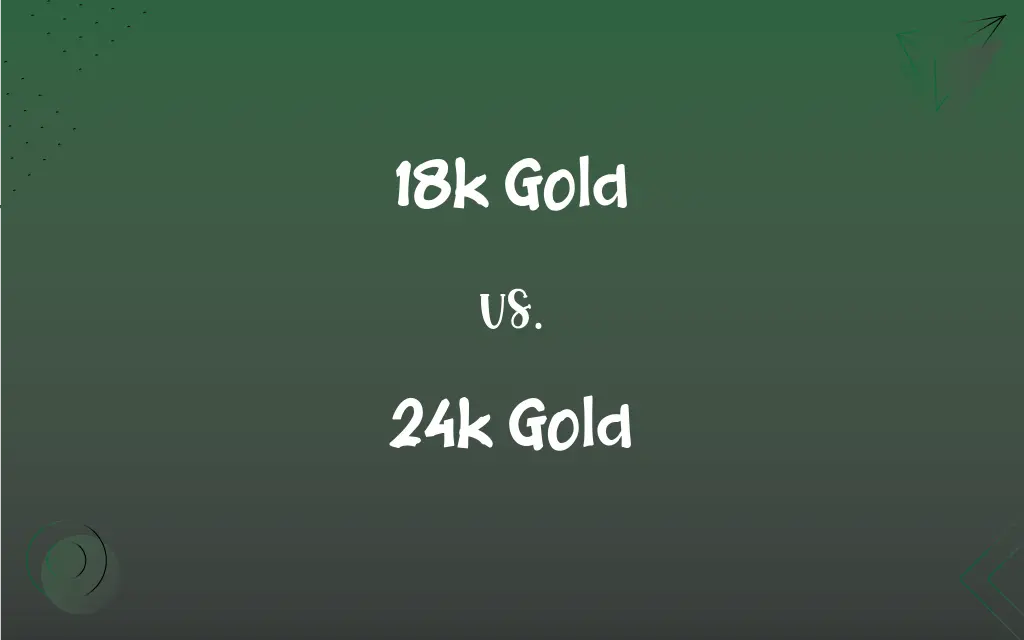18k Gold vs. 24k Gold: What's the Difference?
Edited by Aimie Carlson || By Janet White || Published on January 6, 2024
18k gold contains 75% gold and 25% alloy, offering durability and less purity, while 24k gold is 100% pure gold, softer and more suitable for investment.

Key Differences
18k gold is composed of 75% gold and 25% other metals, like copper or silver, making it more durable and resistant to scratches. 24k gold, on the other hand, is pure gold with no additional metals, which gives it a richer, more vibrant yellow color but makes it softer and more prone to scratching.
The appearance of 18k gold is slightly less vibrant than 24k gold due to its alloy content. It has a rich yellow color but can also be found in rose gold or white gold varieties. 24k gold is the brightest and most intense version of gold, with a deep, saturated yellow hue that reflects its purity.
18k gold is more durable and suitable for everyday wear, as the added alloys provide strength and hardness. In contrast, 24k gold is much softer and more malleable, making it less ideal for daily wear jewelry and more prone to warping and scratching.
18k gold is widely used in jewelry, especially in regions where higher gold content is preferred, balancing durability with a high gold content. 24k gold, being the purest form of gold, is often used in investment gold bars, coins, and in certain cultures for ceremonial jewelry.
In terms of price, 18k gold is generally less expensive than 24k gold. This is because 24k gold is pure gold, and gold is priced by its weight. The added alloys in 18k gold reduce the overall cost, making it a more affordable option for jewelry.
ADVERTISEMENT
Comparison Chart
Purity in Karats
18 karats; indicates 75% gold purity
24 karats; signifies 100% gold purity
Composition
Alloyed with metals like copper and silver
Pure gold, without additional metals
Texture
Harder and more durable
Softer and more malleable
Color Variation
Can be yellow, rose, or white gold
Always a deep, saturated yellow
Typical Use
Commonly used in jewelry
Preferred for investment and ceremonial use
ADVERTISEMENT
18k Gold and 24k Gold Definitions
18k Gold
Less pure than 24k but more durable for wear.
For daily wear, the jeweler recommended an 18k gold bracelet.
24k Gold
Pure gold without any added alloys.
The heirloom was a delicate 24k gold locket.
18k Gold
Often mixed with other metals for color variations.
The 18k gold watch had a subtle rose hue.
24k Gold
Softer and more malleable than lower karat gold.
The artisan sculpted the intricate design in 24k gold.
18k Gold
A gold alloy containing 75% pure gold.
Her engagement ring was made of exquisite 18k gold.
24k Gold
Exhibits a rich, vibrant yellow color.
The 24k gold statue shimmered in the museum display.
18k Gold
A standard for fine jewelry in many countries.
The necklace, crafted in 18k gold, had a luxurious feel.
24k Gold
Ideal for high-value investment and ceremonial pieces.
The royal crown was adorned with exquisite 24k gold detailing.
18k Gold
A popular choice for balancing quality and price.
They chose 18k gold bands for their wedding, striking a perfect balance between quality and affordability.
24k Gold
The highest karat rating, signifying 100% purity.
Investors often prefer 24k gold for its purity.
FAQs
Can 18k gold come in different colors?
Yes, it can be yellow, rose, or white, depending on the mixed alloys.
Is 18k gold suitable for everyday jewelry?
Yes, 18k gold is durable and suitable for daily wear.
Why is 24k gold considered too soft for regular jewelry?
Its purity makes it soft and easily deformable, not ideal for durable jewelry.
Does 18k gold tarnish or corrode over time?
It's more resistant to tarnishing and corrosion compared to higher karat golds.
How can I identify 18k gold?
It's usually stamped with '18k', '750', or similar markings indicating its purity.
Are there any specific uses for 24k gold?
It's mainly used for investment, collectible coins, bars, and ceremonial items.
What is the primary difference between 18k and 24k gold?
18k gold is 75% pure gold mixed with other metals, while 24k gold is 100% pure.
Is 24k gold more expensive than 18k gold?
Yes, due to its higher purity and gold content.
Is 24k gold hypoallergenic?
Yes, as it doesn’t contain other metals that might cause allergic reactions.
What is the best way to care for 24k gold items?
Store them separately and clean gently to avoid scratching.
Does 18k gold hold its value over time?
It generally maintains good value, but not as well as 24k gold.
Is 24k gold considered pure internationally?
Yes, it's recognized globally as the purest form of gold.
Why is 24k gold preferred in certain cultures?
It's often associated with wealth, purity, and status in various cultures.
Are there any special considerations when buying 18k gold?
Consider its composition and ensure it's properly hallmarked for authenticity.
Can 24k gold be used in technology and electronics?
Yes, its excellent conductivity and resistance to corrosion make it valuable in electronics.
What is the weight difference between 18k and 24k gold jewelry?
The weight can be similar, but 24k is denser due to its purity.
Can 18k gold be a good investment?
It's more of a balance between durability and value, less so for pure investment.
Is 24k gold jewelry a common choice?
It's less common for everyday jewelry due to its softness.
Can 18k gold be easily resized and repaired?
Yes, its alloy composition makes it easier to work with than 24k gold.
How does the color of 18k gold compare to 24k gold?
18k gold is less vibrant and can vary in color, while 24k gold is a brighter yellow.
About Author
Written by
Janet WhiteJanet White has been an esteemed writer and blogger for Difference Wiki. Holding a Master's degree in Science and Medical Journalism from the prestigious Boston University, she has consistently demonstrated her expertise and passion for her field. When she's not immersed in her work, Janet relishes her time exercising, delving into a good book, and cherishing moments with friends and family.
Edited by
Aimie CarlsonAimie Carlson, holding a master's degree in English literature, is a fervent English language enthusiast. She lends her writing talents to Difference Wiki, a prominent website that specializes in comparisons, offering readers insightful analyses that both captivate and inform.







































































